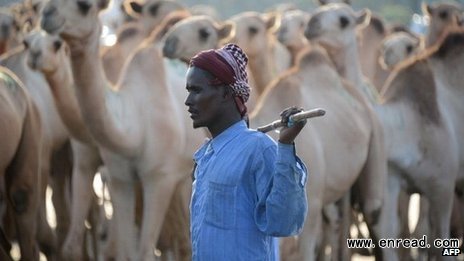| ||||||||||||||||||||||||||||||||||||||||||||||||||||||||||||||||||||||||
|
A ban on slaughtering1 animals anywhere except at a central abattoir2 has come into force in the Somali capital.
索马里首都已经开始执行一项禁止屠杀动物的禁令,中心屠宰场除外。
 Camels are highly prized in Somalia for their milk and meat Until the start of the civil war in 1991, all meat had to be butchered at the Mogadishu Slaughterhouse.
The local authorities have now paid for the premises3(前提) on the eastern outskirts4 of Mogadishu to be revamped and the abattoir has reopened for business.
The BBC's Ibrahim Mohamed says it is part of moves to improve hygiene5 in the city recovering from years of conflict.
Our reporter says traders in Mogadishu have welcomed the move, saying it will be good for business to be able to market "clean meat".
The Mogadishu Slaughterhouse is a partnership6 between the local city government and a private firm, Limco Ltd, he says.
The head of the abattoir, Abdullahi Museh, says 452 people work at the slaughterhouse, which has running water and electricity and is divided into three sections for camels, goats and cows.
At the moment 170 camels, 500 goats and 100 cows were slaughtered7 each day, he told the BBC's Somali Service.
Lorries distribute meat each day to different markets across the city and herders and private individuals could make use of its services, he said.
It costs about $10 to butcher a camel, $5 for a cow and $3 for a goat.
Our correspondent says the opening of the abattoir is the latest public service to return to the city, which is slowly recovering from occupation by rival warlords and latterly Islamist militants8.
点击  收听单词发音 收听单词发音
|
||||||||||||||||||||||||||||||||||||||||||||||||||||||||||||||||||||||||
上一篇:阿富汗罂粟种植量创新高 下一篇:母亲脑死亡92天后剖腹产婴儿成功降生 |
||||||||||||||||||||||||||||||||||||||||||||||||||||||||||||||||||||||||
- 发表评论
-
- 最新评论 进入详细评论页>>



